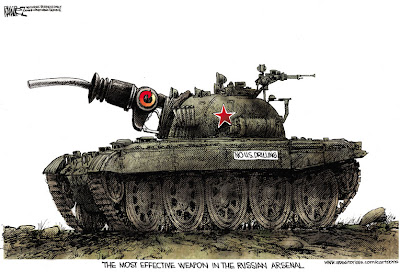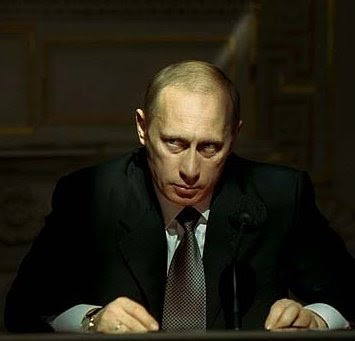And so it begins! Gird your loins!
Medvedev: Russia to Deploy Missiles in Response to U.S. Missile Shield
Russia will deploy missiles near NATO member Poland in response to U.S. missile defense plans, President Dmitry Medvedev said Wednesday in his first state of the nation speech.
Medvedev also singled out the United States for criticism, casting Russia’s war with Georgia in August and the global financial turmoil as consequences of aggressive, selfish U.S. policies.
He said he hoped the next U.S. administration would act to improve relations. In a separate telegram, he congratulated Barack Obama on his election victory and said he was hoping for “constructive dialogue” with the incoming U.S. president.
Medvedev also proposed increasing the Russian presidential term to six years from the current four, a major constitutional change that would further increase the power of the head of state and could deepen Western concern over democracy in Russia.
The president said the Iskander missiles will be deployed to Russia’s Kaliningrad region, which lies between Poland and the ex-Soviet republic of Lithuania on the Baltic Sea, but did not say how many would be used. Equipment to electronically hamper the operation of prospective U.S. missile defense facilities in Poland and the Czech Republic will be deployed, he said.
He did not say whether the short-range Iskander missiles would be fitted with nuclear warheads and it was not clear exactly when the missiles would be deployed.
“Mechanisms must be created to block mistaken, egoistical and sometimes simply dangerous decisions of certain members of the international community,” he said shortly after starting the 85-minute speech, making it clear he was referring to the United States.
The president said Georgia sparked the August war on its territory with what he called “barbaric aggression” against Russian-backed South Ossetia. The conflict “was, among other things, the result of the arrogant course of the American administration, which did not tolerate criticism and preferred unilateral decisions.”
Medvedev also painted Russia as a country threatened by growing Western military might.
“From what we have seen in recent years, the creation of a missile defense system, the encirclement of Russia with military bases, the relentless expansion of NATO, we have gotten the clear impression that they are testing our strength,” Medvedev said.
He announced deployment of the short-range missiles as a military response to U.S. plans to deploy missile-defense facilities in Poland and the Czech Republic — former Soviet satellites that are now NATO members.
Speaking just hours after Obama was declared the victor in the U.S. presidential election, Medvedev said he hoped the incoming administration will take steps to improve badly damaged U.S. ties with Russia. He suggested it is up to the U.S. — not the Kremlin — to seek to improve relations.
“I stress that we have no problem with the American people, no inborn anti-Americanism. And we hope that our partners, the U.S. administration, will make a choice in favor of full-fledged relations with Russia,” Medvedev said.
Tension in Russian-American relations has been driven to a post-Cold War high by Moscow’s war with U.S. ally Georgia.
On the financial crisis, Medvedev said overconfidence in American dominance after the collapse of the Soviet Union “led the U.S. authorities to major mistakes in the economic sphere.” The administration ignored warnings and harmed itself and others by “blowing up a money bubble to stimulate its own growth,” he said.
Medvedev said the president’s tenure should be lengthened to six years to enable the government to more effectively implement reforms. He said the term of the parliament also should be extended by a year to five years, and that parliament’s power must be increased by requiring the Cabinet to report to lawmakers regularly.
The proposals were Medvedev’s first major initiative to amend the constitution since he was elected in March to succeed his longtime mentor Vladimir Putin.
Putin, who is now prime minister and has not ruled out a return to the Kremlin in the future, has favored increasing the presidential term.

